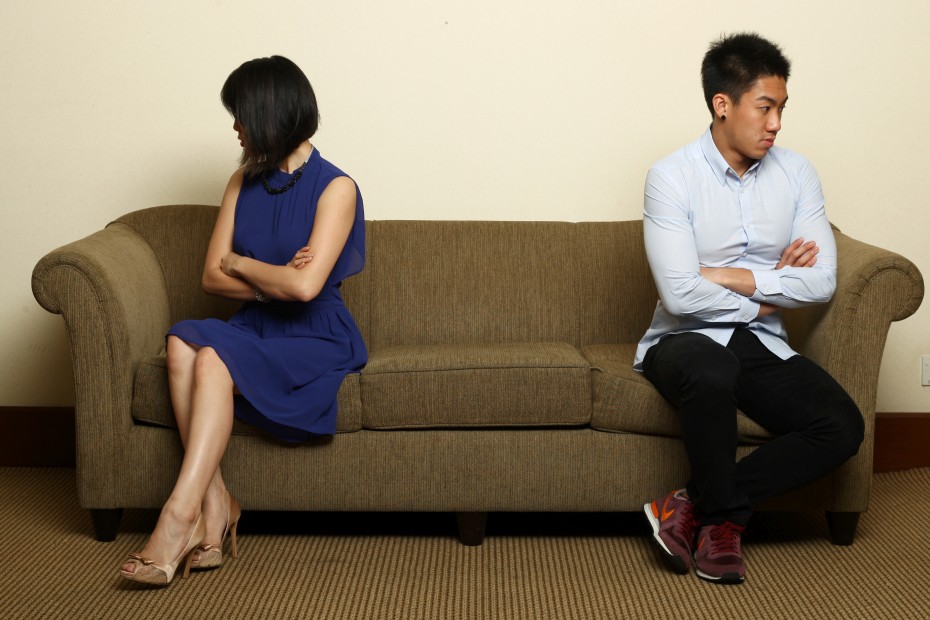IN 2012, there were 56,760 divorces recorded in Malaysia. That’s one every 10 minutes. It’s no secret – divorce is becoming increasingly common. The numbers have doubled since 2004, and when we did a manual check at the KL Family Court (which oversees non-Muslim divorces), there was an astounding 266 divorce petitions between April 28 and May 30 – and that’s just in Kuala Lumpur!
But those numbers aren’t just made up of jaded old couples. There has been a steep rise in the number of divorce petitions being brought by young couples, according to Goh Siu Lin, a family practitioner and president of the Association of Women Lawyers. Halimatunsa’diah Abu Ahmad, a Syariah lawyer, has also observed a large number of young Muslim couples seeking divorces in court.
“On days when I happen to be in court, I sometimes see over 20 young couples a day seeking divorces,” she said. Retired judge Tan Sri James Foong, who previously served in the Family Court, agrees that there are now a fair number of young couples getting divorced, some of whom register their marriage first but end up separating before they ever get to have their wedding dinners.
There are obviously many different reasons why divorce rates have shot up, but the younger generation’s shifting attitudes towards marriage and divorce are clearly a contributing factor. Here, we explore this new mentality towards matrimony.
Divorce? No big deal!

The stigma against divorce has been slowly fading in South-East Asia since the 1980s, according to Professor Gavin Jones of the Asia Research Institute of the National University of Singapore.
Across Asia, the stigma attached to divorce often was the single biggest barrier to getting one. In this generation, that stigma virtually does not exist.
In an article posted on the East Asia Forum in 2013, Professor Gavin Jones of the Asia Research Institute of the National University of Singapore, said “divorce rates throughout East and South-East Asia appear to have been generally on the rise since the 1980s, partly because the stigma attached to divorce appears to have faded.”
Marriage and family therapist Charis Wong of Kin & Kids thinks the increase in divorces has paved the way for more young couples to do the same without the attached stigma, although this is a double-edged sword.
“In one way, people may minimise the sanctity of marriage, because divorce is a way out,” she said. “But on the other hand it reduces the stigma of divorce so people feel like they have options, especially if they are in damaging relationships.”
Professor Dr Low Wah Yun, a chartered psychologist with University Malaya’s Faculty of Medicine, says views have altered dramatically over the years.
“Before, you had to stick to being married whether you liked it or not. But these days, people look at it differently because so many more people are getting divorced. Parents are slowly changing to accept divorce, especially if that’s what makes their children happy,” she said.

Marriage and family therapist Charis Wong believes the rise in divorce rates could compromise the institution of marriage.
I come first.
For a lot of young couples today, personal happiness outweighs an unhappy marriage.
In her 2002 book The Starter Marriage and the Future of Matrimony, author Pamela Paul highlighted the fact that many young couples are unwilling to suffer through the bad parts of a marriage.
“On a positive note, we’re less willing to tolerate unhappy lives and are more optimistic about our rights and abilities to attain personal happiness,” said Paul.
When asked if most young couples value personal happiness over an unhappy marriage, Halimatun was unequivocal.
“Absolutely,” she said, citing a case she’d heard about in Syariah Court involving a young man who wanted a divorce because he couldn’t change the way his wife was. When the judge asked if his wife was the same before the marriage, he said, “Yes, she hasn’t changed a bit.”
The judge then asked why he was penalising his wife when he knew who she was when they got married.
“His own happiness was so important to him that he wanted out because he couldn’t change his spouse to his liking,” said Halimatun.
Michelle Bridget knows what it is like to pursue happiness at the expense of a marriage. Married at 23, she was so unhappy
Girl power: Having the guts to divorce

Women now make up 57% of Malaysian graduates — they are educated, financially independent and socially empowered. They no longer have to put up with harmful relationships.
Gender roles over the decades have changed dramatically. Now, women are more empowered, educated and in control of their careers and life decisions. According to a 2012 research paper, Women Matter: An Asian Perspective by McKinsey & Company, women now make up 57% of Malaysian graduates. Figures from the Women, Family & Community Development Ministry, show that Malaysia’s female workforce was at 52.4% in 2013, not long off the Government’s goal of achieving 55% by 2015.
This means we will be seeing more two-income families, with young women progressively more career-oriented. That’s the good news. The bad news is, archetypal Asian stereotypes and thinking still exist, and the notion that a woman must shoulder the burden of household chores and child care has led to many divorces, said Goh.
“Women are in a double bind,” she said. “They are educated but bear the lion’s share of child care and housework, and ultimately, something has to give.” Now back to the good news – women are also becoming more empowered to divorce themselves from unfair relationships.
Dr Low said: “Women are becoming more liberated and educated, so they are braver about speaking up and saying, ‘hey, I’m not gonna put up with this anymore!’”
30 is the new 20
A new trend in Malaysian marriages could – fingers crossed – give hope to all you loved up young couples out there. Young people are choosing to get married pretty late these days, and never mind what your uncles and aunties say – that’s actually a good thing. In fact, getting married early is so last century.
In 1940, the average age of marriage in Malaysia was 18.5, and in 1970, it was 22.3, according to a research paper by Barbara Von Elm and Charles Hirschman titled Age At First Marriage In Peninsular Malaysia. Now, according to a National Population and Family Development Board survey on trends between 2000 to 2007, the average marrying age of Malaysians appears likely to increase to 33 in 2015.
The postponement of marriage in many Asian countries is closely tied to the spread of education and job opportunities for women as well as the effects of urbanisation and industrialisation, according to University of Malaya Associate Professor Tey Nai Peng in a 2007 article Trends In Delayed And Non Marriage In Peninsular Malaysia.
But, perhaps just as importantly, getting married later could also greatly reduce your risk of getting a divorce. Sociologist Belinda Hewitt of the University of Queensland told the Sydney Morning Herald in 2012: “Basically, if you marry under the age of 25, you have about a four times increased risk of divorce.” Hewitt’s research also indicated that each additional year’s delay in marriage age reduces the odds of marital breakdown by almost six per cent per year for men, and nine per cent per year for women.
Aisya (not her real name) would certainly agree with those figures. Married at 24 and divorced seven years later, she now says: “Don’t rush into marriage just because society believes you should get married by 30, because in your twenties, you may not know what you want yet.”
Dr Low also has concerns about young couples tying the knot, and recommends they take more time to figure things out. “If you’re much more mature, perhaps you can figure out what you want from the marriage. But if you’re young, there are so many things you need to think about and I don’t think one has that maturity yet to cope with certain phases in life (at that age),” she said.



Tell us what you think!